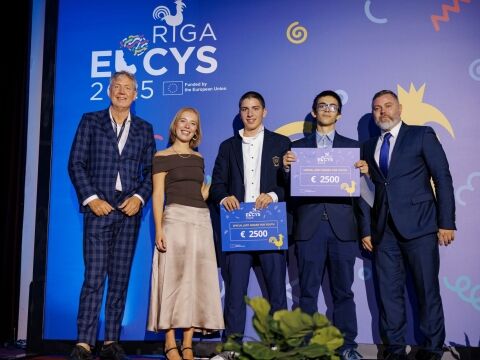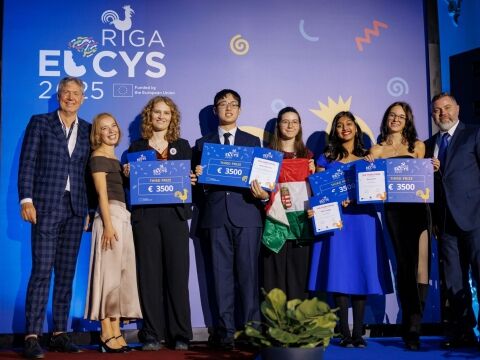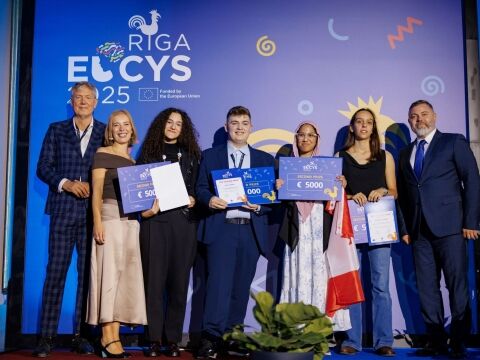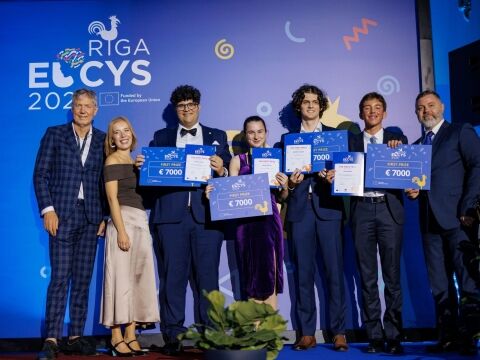Core Prizes
The Core Prizes are the main monetary prizes awarded by the European Commission at the contest. In the case of a team winning such a prize, the amount is shared equally between the members of the team. There are four categories of Core Prizes:
- 4 First Prizes – €7 000 each
- 4 Second Prizes – €5 000 each
- 4 Third Prizes – €3 500 each
- Special Jury Award for Youth 2 500 €
These prizes are awarded directly by the European Commission and represent the highest recognition for the best scientific projects presented during the contest.
Photo: Kaspars Teilāns
Honorary Prizes
In addition to the Core Prizes, the Jury may also award Honorary Prizes, offering winners the opportunity to represent EUCYS at prestigious international science events.
The chosen winners will represent their country at the 67th London International Youth Science Forum (LIYSF), 19th July – 1st August 2026. LIYSF is a two-week
residential event held at Imperial College London, with lectures and demonstrations from leading scientists, visits to industrial sites, research centres, scientific
institutions and organisations, including world class laboratories and universities. LIYSF attracts 500 of the world’s leading young scientists aged 16-21 years old from more than 80 participating countries. There is an active social calendar with events designed to enable those from around the world to learn about different cultures. The scope of LIYSF extends further than broadening scientific understanding to engage
students in education on other cultures and develop lasting, international friendships.
The Stockholm International Youth Science Seminar (SIYSS) is an annual week long event for international young scientists, arranged in connection with the Nobel festivities by the SIYSS Committee of the Swedish Federation of Young Scientists in
collaboration with the Nobel Foundation. The history of SIYSS dates back to 1976 when the first seminar was organised by the Swedish Federation of Young Scientists together with the Nobel Foundation, with inspiration from the Society for Science & the Public in USA. Turning into a great success, the SIYSS program has continued to combine Swedish science with the Nobel Prize Awarding Ceremonies with an intense
social program. The programme aims to promote international understanding and friendship, bringing together young people from all over the world with similar interests. The participants are selected in different ways; some are winners of national science fairs, others represent organisations for young scientists or are selected by merit at their home universities. Whatever their background, they all have two things in common: a great interest in natural sciences and a curiosity for
other cultures and people. These non-monetary awards provide valuable international experience and networking opportunities with scientists from around the world.
For further information, please contact:
The SIYSS Organizing Committee Förbundet Unga
Forskare Lilla Frescativägen 4C S-104 05
Stockholm, Sweden
Email:
These non-monetary awards provide valuable international experience and networking opportunities with scientists from around the world.
Special Donated Prizes
Every year, EUCYS also features a selection of Special Donated Prizes provided by sponsors and science institutions. These prizes are tailored to support young scientists in continuing their scientific journey and are awarded based on the Jury’s assessment and the criteria set by the prize donors.
The Luxembourg International Science Expo award is a non-competitive international exhibition organised by the Fondation Jeunes Scientifiques Luxembourg that aims to promote international relations and the exchange of ideas and cultures among participants. During the LISE event, which takes place over several days, participants not only get to showcase their scientific projects but also take part in many cultural and social activities that allow them to make lasting memories and friendships with like-minded but diverse people. In the past editions, close to 30 countries sent delegates to the exhibition. Three students will be invited to attend Expo-Sciences Luxembourg with their individual projects.
This prize offers a trip to visit Oxford, including a visit to a University of Oxford college and department plus a tour around the Ellison Institute of Technology’s offices, to learn more about EIT’s work to develop and deploy commercially sustainable solutions to solve some of humanity’s most enduring challenges.
This prize will include travel, food, and accommodation for up to three students young students aged 15 or 16 at the time of the visit who, according to the jury, will benefit from this stay. The trip will take place in spring/summer 2026 and also covers travel, food and accommodation for one accompanying adult per winning student.
The International Swiss Talent Forum (ISTF) is a politically independent think-tank for young adults (18 to 23 years) who are interested in the universal and long-term challenges of our time. It was launched by the foundation Swiss Youth in Science in 2009 and brings talented young people to Switzerland from all over the world.
By placing students alongside experts, decisionmakers, and lateral thinkers, the ISTF creates a space for innovation, interaction and debate aimed at developing new solutions to current global issues. Working closely in such a setting, the participants will learn how to tackle interdisciplinary challenges with solution-oriented approaches. They also have the chance to build a network of national and international contacts – a launchpad for their aspirations in business, science or politics. Two young scientists will be invited to participate to the ISTF 2026.
Swiss Youth in Science is a Swiss foundation based in Bern that fosters scientific curiosity and independent thinking among children, adolescents, and young adults. We support young people in discovering their intrinsic motivation, talents, and creativity. Through targeted coaching, we encourage independent research, critical thinking, and innovative exploration. In doing so, we contribute to the sustainable development of Switzerland by empowering future generations to question the status quo and shape tomorrow’s solutions.
The award will be given to one project and includes an invitation to participate in the Bulgarian National Coding Theory workshop, or another mathematical forum aligned with the topic of the project.
The workshop, now named after its founder, Professor Stefan Dodunekov (1945–2012), was established in the 1980s and serves as a forum dedicated to topics such as coding theory, cryptography, communication theory, and other foundational areas of computer
science. The seminar brings together researchers from various countries and career stages—from leading specialists to undergraduate students and PhD candidates. Special sessions are devoted to emerging research topics, interdisciplinary connections, and the development of project-based and long-term collaborations.
Professor Dodunekov, a renowned scholar in the algebraic and combinatorial theory of error-correcting codes and their applications in data protection and information security, was the founder of the forum. As part of his vision, during his tenure as Director of the Institute of Mathematics and Informatics at the Bulgarian Academy of Sciences, he initiated numerous programs to support secondary and university students pursuing careers in science.
The winner of the 2025 contest, selected for their individual biomedicine project, will be awarded a fiveday stay at the CNIC in July 2026 as part of the CNICJoven Acércate Program. This prize is intended for the participant who, in the opinion of the jury, stands to benefit most from this experience. The award covers travel expenses, meals, and accommodation. During the stay, the awardee will have the opportunity to engage directly with CNIC researchers and technical staff, gaining firsthand experience of ongoing projects. They will also explore the Center’s state-of-the-art infrastructure and cutting-edge technologies employed in addressing key challenges in cardiovascular health and disease research.
Requirements for the CNIC award winner:
- age: 18 or 19
- project: individual and in the biomedicine field
The European Chemical Society is pleased to offer a prize of €1,000 to the best Chemistry project The European Chemical Society (EuChemS) brings together 50 member organisations from 36 countries, representing more than 140,000 chemists working in academia, industry, government, and professional organisations across Europe. Founded in 1970, EuChemS provides a unified voice on key scientific and policy issues, rounded in expert knowledge, and promotes chemistry as a central contributor to addressing societal and environmental challenges. Its Professional Networks span all areas of chemistry, supporting collaboration among European scientists and contributing expert input to policy discussions.
EuChemS organises the biennial EuChemS Chemistry Congress, open to all, and runs an event recognition scheme to support and promote chemistry-related events throughout Europe. Through its prestigious awards, EuChemS recognises excellence in science, innovation, and societal impact, celebrating individuals and teams whose work drives progress and benefits society. In addition, EuChemS actively promotes clear and accessible communication of chemistry and science-policy through its magazine, website, social media, and events, raising public awareness of chemistry’s vital role in tackling global challenges.
The Circular Bio-based Europe Joint Undertaking (CBE JU) is a partnership between the European Union and the Bio-based Industries Consortium (BIC) that funds projects advancing sustainable, circular bio-based innovations across Europe. By de-risking investments in the development of sustainable chemicals, materials, food and feed ingredients, and soil nutrients, among other solutions derived from biological resources, the partnership supports the emergence of strong European bio-based industries while promoting the efficient use of sustainably sourced biomass, including waste and residues. Since 2014, CBE JU has invested €1.3 billion in 220 projects and supported 1,700 organisations across 45 countries. Each euro invested by CBE JU has attracted €3.5 in private funding.
Each year more than 1,600 finalists earn the right to compete at Regeneron ISEF by winning a nomination at a Society for Science affiliated local, regional, state
or national science fair. Society for Science is proud to partner with the European Union Contest for Young Scientists to offer two contestants the opportunity to participate as finalists at Regeneron ISEF 2026 in Phoenix, Arizona. Winning contestants will travel with their country’s official party and will have their travel and accommodation expenses covered to attend the 2026 Regeneron ISEF. The winning contestants will also be eligible to receive both Grand Awards and Special Awards while competing in the 2026 Regeneron ISEF.
We look forward to welcoming winning contestants from the European Union Contest for Young Scientists in Phoenix, Arizona.
EIROforum Prizes
European X-Ray Free-Electron Laser Facility GmbH (European XFEL) offers one project prize (up to 3 people) of a one-week placement at its site in Schenefeld (Hamburg metropole).
The European Space Agency (ESA) offers a single prize winner the opportunity to participate in an ESA Academy training session in ESEC, Belgium. The winner should be an eligible tertiary education student. The eligibility criteria are as follows:
• aged minimum 18 years old;
• be a citizen of an ESA Member State, an ESA Associate Member (Latvia, Lithuania, or Slovakia), or Canada;
• be enrolled as a university student for the academic year 2025-2026.
European Southern Observatory (ESO) offers a project prize (for up to 3 people) of a visit of up to one week to the ESO headquarters in Germany. The age minimum for ESO’s prize is 16 years.
The European Molecular Biology Laboratory (EMBL) offers a project prize (for up to 2 people as a team) as a conference voucher plus a short visit to a facility or lab
at EMBL Headquarters in Heidelberg, Germany.
The Institut Laue-Langevin (ILL) offers up to 2 people (3 if the ILL prize is combined with that of the ESFR) of a winning project, a one-week visit to its site in Grenoble.
European Synchrotron Radiation Facility (ESRF) offers up to 2 people (3 if the ESRF prize is combined with that of the ILL) of a winning project, a one-week
visit to its site in Grenoble.
EUROFusion offers one project a one-week stay (for up to 3 people) at a EUROfusion member research facility.
The European Organization for Nuclear Research (CERN) offers a project prize (for up to 3 people) of a week’s visit to its Geneva site.
Local Prizes
Special Prize of the University of Latvia
The University of Latvia offers as a prize for one participant the attendance to the international Deep Tech Atelier 2026 conference in Riga and a two-day visit to the University of Latvia’s laboratories. All travel and accommodation expenses for the awardee (1 person) will be covered.
Deep Tech Atelier is the largest technology conference in the Baltics, bringing together entrepreneurs, scientists, investors, and industry experts to discuss topics such as artificial intelligence, quantum technologies, space, and defense.
Special Prizes of the Latvian Council of Science
The Latvian Council of Science (LCS), within the Swiss–Latvian Cooperation Programme, will award prizes to up to four the highest-rated projects in the fields of smart materials, information and communication technologies (ICT), and smart energy, which are project fields of the Swiss–Latvian Cooperation programme and align with EUCYS categories such as Computing, Materials, Environment, Physics, and Engineering.
The prize will be an online training course aimed at the further development of the young participant’s scientific project. This course will provide an opportunity to strengthen scientific knowledge, acquire new skills, and receive guidance from experts to advance the project towards practical implementation, innovation, or commercialization. It will include mentorship, interactive learning and practical tasks tailored to support the next stages of the participant’s research work.



